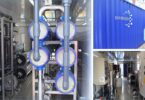Exclusive interview: We caught up with Olivier Narbey, Senior Business Development Manager at GF Piping Systems, to find out how they reduce non-revenue water (NRW) and help their clients build climate resilience
One of the world’s leading flow solutions provider for the safe and sustainable transport of fluids, GF Piping Systems creates connections for life. A division of Georg Fischer AG, founded in 1802 and headquartered in Schaffhausen, Switzerland, the firm focuses on supplying industry-leading leak-free piping solutions for numerous demanding end-market segments.
One of the companies main markets is the water industry, supplying its plastic piping solutions for wastewater treatment, drinking water, desalination, and industrial process water.
GF Piping Systems has its own sales companies in 31 countries, with production sites in 36 locations in America, Europe, and Asia.
Olivier Narbey, Senior Business Development Manager at GF Piping Systems, explains how the company helps the water industry adapt to climate change.
How is climate change impacting water?
In the face of climate change, water is becoming an increasingly valuable resource. The first challenge is availability: 40% of the world’s population are affected by water scarcity and around 55 million people are threatened by droughts. This could lead to the displacement of up to 700 million people by the year 2030.
The second challenge is water distribution. On the one hand, population numbers are continuing to rise. At the same time, global industries heavily rely on water as an important resource to produce commodities such as electronics, pharmaceuticals, or food. As a result, water demand is predicted to rise by 20-30% until the year 2050.
What are you doing to raise awareness around climate change?
Water is a valuable resource. The need to reduce water loss to more acceptable levels has made non-revenue water (NRW) one of the most challenging problems for water utility owners and operators to overcome.
To raise awareness we have initiated a webcast series “Solving water loss for life” around NRW. Non-revenue water is the difference between the water entering a distribution system and the amount billed to water consumers. NRW is not the only actual loss of water, such as leakage or pipe bursts, but it also can impact all levels – from water abstraction to billing.
Causes are as diverse as they are complicated to identify and measure, making NRW a major topic to ensure the future of resilient utilities.
What water technologies do you currently use?
GF Piping Systems is a flow solutions provider that ensures in the safe and reliable transport of water. As a specialist for plastic piping systems, the Swiss company offers a broad range of products that help both industrial companies and utilities to make their water applications more efficient, long-lasting, and cost-effective.

Marco Alberti, Sales Manager Utility GF Piping Systems, inspecting NeoFlow installation at IRETI
For utilities, for example, GF Piping Systems offers NeoFlow, a pressure regulating valve designed to intelligently improve pressure management in water networks. Without a diaphragm or actuator stem, the innovative valve features a simplified construction that significantly lowers maintenance requirements.
In addition, its lightweight polymer body is corrosion-free and up to five times more compact than metal valves. The combination of an axial flow and an integrated pilot-valve allow operators to monitor and control their valves accurately and intelligently.
How does your water solution help utilities build climate resilience?
In the face of water scarcity and rising water demand, utilities must optimise their existing networks as much as possible. Currently, it is estimated that 126 billion m³ of water are lost each year at a cost of $39 billion. This NRW is either due to organisational issues like theft and a lack of water meters, or due to physical losses such as leakages.
Most leakages are the result of ageing infrastructure or poor pressure management. By decreasing excess pressure by 25%, utilities can reduce pipe bursts by 75% .
Pressure regulating valves such as NeoFlow are an essential tool to lower the flow rates of existing leaks as well as the overall mechanical load on the water infrastructure. Because of this, NeoFlow helps to preserve valuable water resources while simultaneously lowering the maintenance costs of the water network.
Finally, modern pressure management makes water treatment more sustainable – even a 5% reduction of water leakages can save up to 225.000 metric tons of CO2 every year, as less water needs to be treated and pumped into the network.
Can you give an example of how you have helped one of your customers improve their climate resilience?
Many clients are very conscious of the current challenges concerning water and implement products by GF Piping Systems to improve their water applications.
The Italian company IRETI, for example, is responsible for the water supply of over 2,5 million people throughout 300 municipalities in Northwest Italy.
In the past, IRETI has had issues with water loss and the associated problems of maintenance and short asset lifetimes. But while the average Italian water loss is around 37%, the utility company has been on the lookout for technical solutions that improve the performance of its networks and preserves precious water resources.
After conducting a test in a laboratory setting, IRETI has elected to install the NeoFlow pressure regulating valve by GF Piping Systems. Thanks to the new valves, pipe bursts in the expansive water network have been reduced by over 60%.
IRETI and its customers now benefit from lower operating costs as well as less downtime due to maintenance. The utility company is able to reduce the requirement for pumped water which leads to energy savings of 30 e.t.p. (equivalent tons of petrrol). And due to the intelligent functionality of NeoFlow, IRETI has also prepared their pressure management for a digital future.







